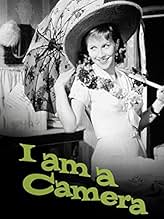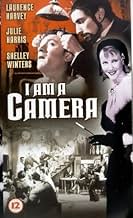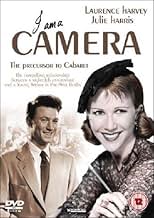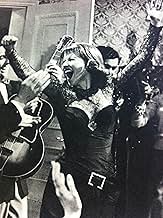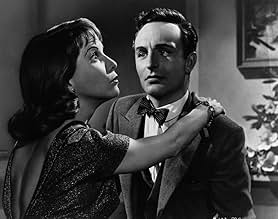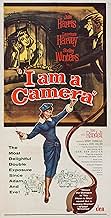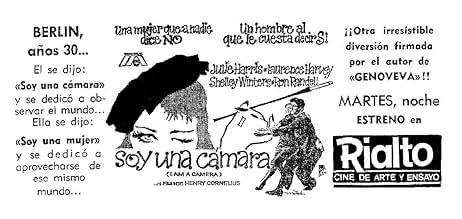VALUTAZIONE IMDb
6,3/10
703
LA TUA VALUTAZIONE
Aggiungi una trama nella tua linguaIn Weimar-era Berlin, an aspiring writer strikes up a friendship with a vivacious, penniless singer.In Weimar-era Berlin, an aspiring writer strikes up a friendship with a vivacious, penniless singer.In Weimar-era Berlin, an aspiring writer strikes up a friendship with a vivacious, penniless singer.
- Regia
- Sceneggiatura
- Star
- Nominato ai 1 BAFTA Award
- 1 candidatura in totale
William Adams
- Old Doctor
- (non citato nei titoli originali)
Ian Ainsley
- Minor Role
- (non citato nei titoli originali)
Charles Andre
- Waiter
- (non citato nei titoli originali)
Julia Arnall
- Model
- (non citato nei titoli originali)
Jack Arrow
- Troika Doorman
- (non citato nei titoli originali)
Recensioni in evidenza
This film was inexplicably made in England, and though there is some staginess - noticably in the yelling of some of the actors - director Henry Cornelius provides some clever imagery eg the decadence of the Berlin nightclub by a piglet and two smashing beerglasses, and Christopher standing at a window in the past bringing out us out of the narrative flashback. It also features a remarkable hotel party setpiece.
The infamous role of Sally Bowles is written as a pretentious innocent, and the knowledge that Isherwood was gay feeds into the notion of Sally as a coded drag queen, or at least, an effeminate gay man. The screenplay is full of gay subtext eg Christopher's narcissism demonstrated in his lotions and weights and boufant hairstyle, Sally's descriptions of male musculature, the repeated use of sausages, Sally telling Christopher he doesn't "understand" women, his describing her sex appeal as "inadequate", the rectal thermometer, his massage, his confession that he is "not the marrying type", and fear of being "embroiled" with her. The major difference between this treatment and that of Bob Fosse's Cabaret is the Clive Mortimer character, who here is heterosexual, but would be later turned into the bisexual Max.
Julie Harris performed the role of Sally Bowles on Broadway, and one's opinion of her performance cannot help but be influenced by Liza Minnelli (as is one's opinion of the film as a piece). Harris works against her basic miscasting (she doesn't even use an English accent when we are told Sally is English) because Sally is such an artificial creation. She is like an Actors Studio version of a junior Auntie Mame, and even when her antics become tiresome, she is still far more likeable than Laurence Harvey's starched and basically asexual Christopher. Harris may not have Minnelli's street urchin vulnerability, but she has some inspired moments - posing in front of a mirror wearing a mink coat, her drunken giggling, looking behind a silk scarf, or licking milk with a wild tongue.
The infamous role of Sally Bowles is written as a pretentious innocent, and the knowledge that Isherwood was gay feeds into the notion of Sally as a coded drag queen, or at least, an effeminate gay man. The screenplay is full of gay subtext eg Christopher's narcissism demonstrated in his lotions and weights and boufant hairstyle, Sally's descriptions of male musculature, the repeated use of sausages, Sally telling Christopher he doesn't "understand" women, his describing her sex appeal as "inadequate", the rectal thermometer, his massage, his confession that he is "not the marrying type", and fear of being "embroiled" with her. The major difference between this treatment and that of Bob Fosse's Cabaret is the Clive Mortimer character, who here is heterosexual, but would be later turned into the bisexual Max.
Julie Harris performed the role of Sally Bowles on Broadway, and one's opinion of her performance cannot help but be influenced by Liza Minnelli (as is one's opinion of the film as a piece). Harris works against her basic miscasting (she doesn't even use an English accent when we are told Sally is English) because Sally is such an artificial creation. She is like an Actors Studio version of a junior Auntie Mame, and even when her antics become tiresome, she is still far more likeable than Laurence Harvey's starched and basically asexual Christopher. Harris may not have Minnelli's street urchin vulnerability, but she has some inspired moments - posing in front of a mirror wearing a mink coat, her drunken giggling, looking behind a silk scarf, or licking milk with a wild tongue.
Lots of history behind this story of Sally Bowles, party-girl in 1930s Berlin who befriends a stolid English gent amidst the Nazi uprising. Curious, rather indifferent drama isn't helped by Julie Harris as Bowles; Harris tries hard, but she's too intelligent a presence to be convincing as a flake and her big moments don't come off. Non-flashy adaptation of both Christopher Isherwood's "Berlin Stories" and John Van Druten's subsequent play, it is sure to interest fans of Bob Fosse's "Cabaret" as a great deal of the dialogue mirrors passages in "Cabaret" almost verbatim. Those who stumble upon it unawares will probably find the movie stilted and dull. It's little more than a footnote now in this chain of literature and cinematic events. ** from ****
Unfortunately for Henry Cornelius's "I am a Camera" and its delightful star, Julie Harris, that film will forever lie in the shadow of Bob Fosse's Oscar-winning musical, "Cabaret." This 1955 film, the 1972 Fosse musical, the original 1951 stage play, and the 1966 Kander and Ebb Broadway musical were all based on stories by Christopher Isherwood; the tales relate the writer's time spent in Berlin during the early 1930's, where he met and enjoyed a platonic relationship with the irrepressible Sally Bowles, a cabaret singer and aspiring film star. Bookended by Isherwood in voice-over recalling Bowles and Berlin to colleagues at a reception for the publication of Bowles's memoirs, "I am a Camera" is a highly enjoyable movie that has unjustly been eclipsed by the subsequent musical version.
Comparisons between the two movie versions are inescapable. "I am a Camera" was filmed late in period when the Motion Picture Production Code and the Legion of Decency ruled Hollywood; any mention of homosexuality, bisexuality, promiscuity, or abortion were forbidden, and those subjects are only alluded to with veiled references. However, by the time Fosse filmed the musical remake, the Code and the Legion were history, and, in "Cabaret," Christopher openly liked boys, Sally had an abortion, and Sally's straight boyfriend, Clive, in the earlier film, had become the bisexual Maximilian von Heune, who bedded both Sally and Chris. Although the rise of the Nazis and anti-Semitism were depicted in both films, "Cabaret" hit the subject with more force.
Julie Harris created Sally Bowles on stage, and her performance in "I am a Camera" is wonderful; she is alternately touching, exasperating, thoughtless, endearing, and always flamboyant as a nightclub singer of lesser talent, who dreams of big things, but always chooses the wrong men in her pursuit of the good life. Laurence Harvey is quite good in the less showy role of Chris; his overlong pouffed hair, prudishness, and indifference to Harris's physical charms wordlessly suggest his sexual orientation. Anton Diffring and Shelley Winters are also effective as the Jewish lovers, Fritz and Natalia, who cautiously court, while the threat of Naziism swirls around them. Ron Randell is also fine as Clive, Sally's wealthy party-loving beau.
Although short and censored, "I am a Camera" is possibly truer to Isherwood's stories and the real Sally than was "Cabaret." Based on a play by John van Druten, John Collier adapted and likely sanitized Isherwood for the screen. Shot in black and white by Guy Green, the film retains some staginess, but maintains a decent pace. However, most importantly, "I am a Camera" preserves the Julie Harris performance that created the unforgettable Sally Bowles.
Comparisons between the two movie versions are inescapable. "I am a Camera" was filmed late in period when the Motion Picture Production Code and the Legion of Decency ruled Hollywood; any mention of homosexuality, bisexuality, promiscuity, or abortion were forbidden, and those subjects are only alluded to with veiled references. However, by the time Fosse filmed the musical remake, the Code and the Legion were history, and, in "Cabaret," Christopher openly liked boys, Sally had an abortion, and Sally's straight boyfriend, Clive, in the earlier film, had become the bisexual Maximilian von Heune, who bedded both Sally and Chris. Although the rise of the Nazis and anti-Semitism were depicted in both films, "Cabaret" hit the subject with more force.
Julie Harris created Sally Bowles on stage, and her performance in "I am a Camera" is wonderful; she is alternately touching, exasperating, thoughtless, endearing, and always flamboyant as a nightclub singer of lesser talent, who dreams of big things, but always chooses the wrong men in her pursuit of the good life. Laurence Harvey is quite good in the less showy role of Chris; his overlong pouffed hair, prudishness, and indifference to Harris's physical charms wordlessly suggest his sexual orientation. Anton Diffring and Shelley Winters are also effective as the Jewish lovers, Fritz and Natalia, who cautiously court, while the threat of Naziism swirls around them. Ron Randell is also fine as Clive, Sally's wealthy party-loving beau.
Although short and censored, "I am a Camera" is possibly truer to Isherwood's stories and the real Sally than was "Cabaret." Based on a play by John van Druten, John Collier adapted and likely sanitized Isherwood for the screen. Shot in black and white by Guy Green, the film retains some staginess, but maintains a decent pace. However, most importantly, "I am a Camera" preserves the Julie Harris performance that created the unforgettable Sally Bowles.
Hindsight is a wonderful thing. Much reviled when it first appeared, (inspiring the famous review 'Me No Leica'), this precursor of "Cabaret" can now be looked at in comparison and it's not half bad. It's certainly no classic but it has its own wayward charm, (the film version of "Cabaret" follows this plot whereas the stage version changed the plot somewhat). One should, of course, resist the temptation to snicker when Laurence Harvey's Christopher Isherwood, (it keeps the original author's real name; God Knows what Isherwood thought of it), describes himself as 'a confirmed bachelor' and while Harvey is an utterly inadequate 'hero', (he's virtually asexual), and Shelly Winters woefully miscast as Fraulien Landauer, (the part Marisa Berenson played in "Cabaret"), Julie Harris is a perfectly marvellous Sally, (it's a lovely piece of comic acting), and Anton Diffring is first-rate as Fritz, the German-Jew in love with Shelly's character. Of course, if "Cabaret" had never come along you might ask yourself would this ever have seen the light of day again. That it has been revived may not quite be cause for celebration but it's perfectly acceptable all the same.
This British film version of the stage play I AM A CAMERA is based on Christopher Isherwood's "Berlin Stories." This is the source material for the famous musical CABARET.
Julie Harris, a major stage actress of her day, reprises her 1951 Tony Award winning role as Sally Bowles. She's a far cry from the Liza Minnelli character but the basic "Sally" is all here despite the various film codes that would have blocked this story from being filmed in Hollywood. Harris is perhaps stagy but she's also quite good as the madcap and maddening Sally. Her singing number is obviously dubbed (by Marlene Dietrich no less) although Harris apparently sings for herself in other moments.
Laurence Harvey (with the very ugly hair) plays Isherwood with zero charm and can't even make the character interesting. Shelley Winters does little with the role of Natalia (Marian Winters won a supporting Tony for the play), and Anton Diffring is OK as Fritz. Ron Randell plays the caddish Clive but seems a tad loud. Lee Seidl is funny as the landlady.
Yet despite the overall staginess and cheap look, Harris takes center stage and she is amazing. This film was released the same year as EAST OF EDEN in which Harris gives a glowing performance as Abra. Comparing the two performances gives a good look at the talent Miss Harris possesses. These two characters couldn't be more unalike. Harris' Sally preens and prances about and growls out a very lascivious laugh. She also acts circles around the boring Harvey.
Without the music and with a familiar storyline, many viewers may find little here to recommend this film, but it's a great chance to see the great Julie Harris repeating what was probably a very shocking role in 1951.
Julie Harris, a major stage actress of her day, reprises her 1951 Tony Award winning role as Sally Bowles. She's a far cry from the Liza Minnelli character but the basic "Sally" is all here despite the various film codes that would have blocked this story from being filmed in Hollywood. Harris is perhaps stagy but she's also quite good as the madcap and maddening Sally. Her singing number is obviously dubbed (by Marlene Dietrich no less) although Harris apparently sings for herself in other moments.
Laurence Harvey (with the very ugly hair) plays Isherwood with zero charm and can't even make the character interesting. Shelley Winters does little with the role of Natalia (Marian Winters won a supporting Tony for the play), and Anton Diffring is OK as Fritz. Ron Randell plays the caddish Clive but seems a tad loud. Lee Seidl is funny as the landlady.
Yet despite the overall staginess and cheap look, Harris takes center stage and she is amazing. This film was released the same year as EAST OF EDEN in which Harris gives a glowing performance as Abra. Comparing the two performances gives a good look at the talent Miss Harris possesses. These two characters couldn't be more unalike. Harris' Sally preens and prances about and growls out a very lascivious laugh. She also acts circles around the boring Harvey.
Without the music and with a familiar storyline, many viewers may find little here to recommend this film, but it's a great chance to see the great Julie Harris repeating what was probably a very shocking role in 1951.
Lo sapevi?
- QuizDespite being far less salacious than the 1951 stage play on which it was based, this film adaptation received a "Condemned" rating from the Legion of Decency, a Roman Catholic organization that passed moral judgments on films between 1933 and 1965. This rating was also given to Psyco (1960), A qualcuno piace caldo (1959) and Fino all'ultimo respiro (1960).
- BlooperWhilst most of the film is a flashback set in the early 1930s, all the costumes and hairstyles worn are straight out of the early 1950s.
- Citazioni
Christopher Isherwood: [to Sally] Any mess you get into, you try and get out of by using your extremely inadequate sex appeal.
- Curiosità sui creditiIn opening credits, Shelley Winters is misspelled "Shelly".
- ConnessioniFeatured in Omnibus: Christopher Isherwood: A Born Foreigner (1969)
- Colonne sonoreI Saw Him in a Café in Berlin
(uncredited)
Music by Ralph Maria Siegel
English lyrics by Paul Dehn
Sung by Liselotte Malkowsky
[Sally (Julie Harris) sings the song in her club act]
I più visti
Accedi per valutare e creare un elenco di titoli salvati per ottenere consigli personalizzati
- How long is I Am a Camera?Powered by Alexa
Dettagli
- Tempo di esecuzione
- 1h 38min(98 min)
- Colore
- Proporzioni
- 1.37 : 1
Contribuisci a questa pagina
Suggerisci una modifica o aggiungi i contenuti mancanti


